Update 11-26-20
Pan Thar’s “Life tale of a Rohingyan Soul” was recently featured on Litlight.
“I communicate and work with many Rohingya poets and poetesses who are writing poetry for various platforms. Our writing makes us not only feel glad but also to be proud of our activism for our community. Our pens are our guns. Our words are our bullets. Our ink is our activism.”
-Pan Thar, Rohingya poet
Bringing two worlds together
Par Thar, Rohingya poet
In the past 18 months I have been in contact with many young Rohingya men and women now living in the world’s largest refugee camp in Cox’s Bazar, Bangladesh. Most are victims of genocidal persecution from the Myanmar government and military, fleeing along with over 700,000 other Rohingya to Bangladesh in August of 2017. I have written many posts about what I have called ‘refugee humanitarians‘ and have kept up with the lives of
most via social media. I continue learning about the human rights struggles of the Rohingya and am following the genocide case against the Myanmar government now being examined by the International Court of Justice.
Refugee camp life is hard, and there are many pressures to succumb to the negative forces swirling about the narrow pathways between the bamboo and plastic sheeting houses. Many Rohingya women and men demonstrate great resolve and strength, daily fighting those forces. For every act of violence in the camps there are hundreds of actions, both big and small, which never make the news. I have been privileged to meet (virtually) many kind, compassionate, and brave Rohingya souls. Meet Pan Thar, one shining light among many.
Last week I noticed a Facebook post highlighting a poem recently published in the Art Garden of the Rohingya by a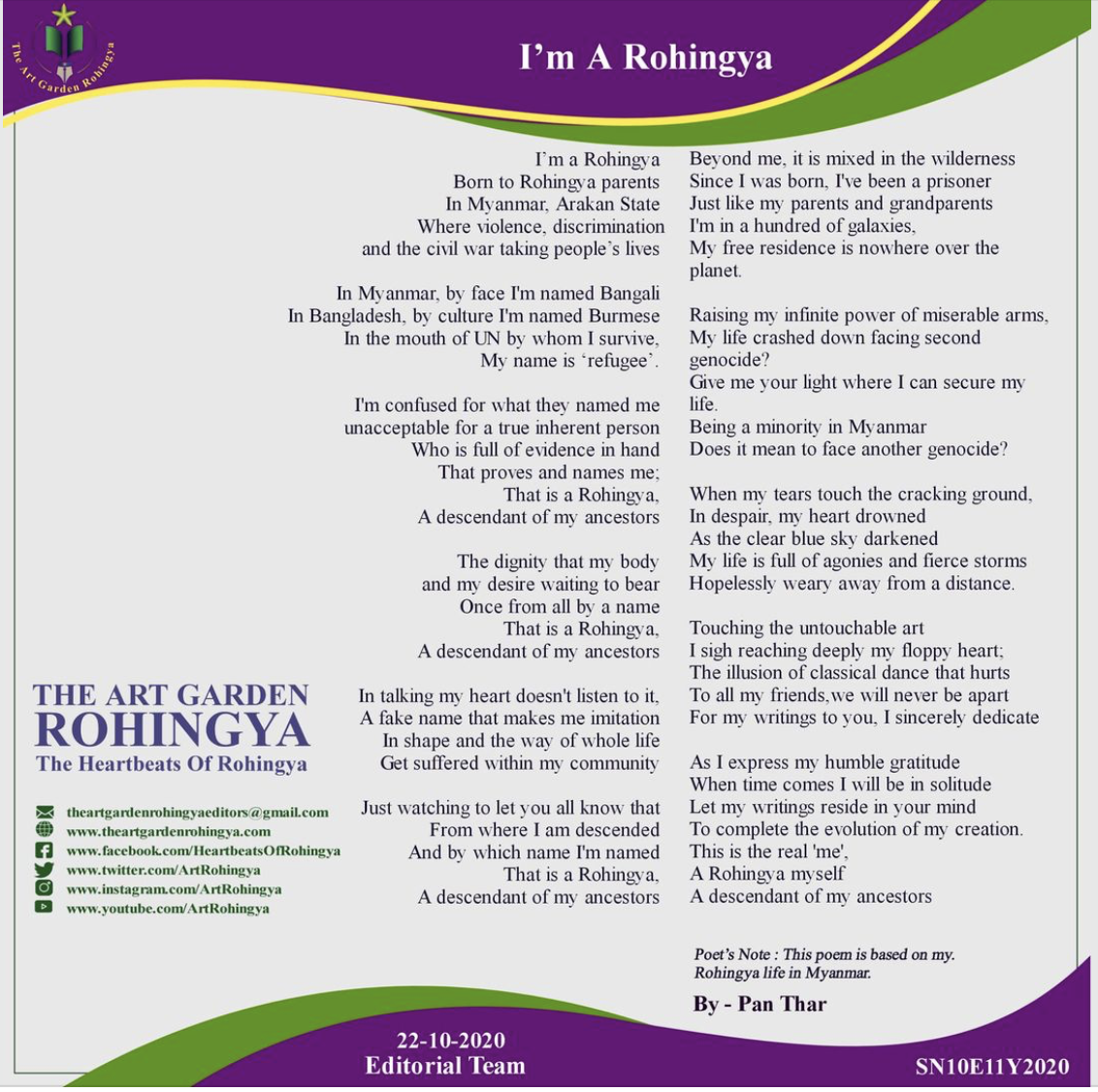 young man named Pan Thar. I commented on the poem, mentioning that I would talk about it to my university sociology classes. The poem addressed self identity and the need to be in control of one’s destiny, both topics we have examined.
young man named Pan Thar. I commented on the poem, mentioning that I would talk about it to my university sociology classes. The poem addressed self identity and the need to be in control of one’s destiny, both topics we have examined.
Here is the video of me reading the poem to my class.
Via Facebook Messenger, we talked. Below is part of the discussions we’ve had.
Here is what he wrote describing himself:
“I, Pan Thar am a Rohingya youth student, Humanitarian Aid-Worker, Photographer and budding writer (poet) of the present generation and writing is my passion. Faced by racism I was born to Rohingya parents in Maungdaw, Northern Rakhine State (also popularly knows as Arakan State), Myanmar where most of the Rohingya people live. My Rohingya community was facing violence, discrimination and civil-war for decades. I want to be one of the most educated people in the world to create peace and harmony for the entire world.”
I learned from Pan that he has written over 250 poems since he started putting pen to paper in 2018. Many of his poems have been published in on line sites such as The Art Garden of the Rohingya, Litlight, Speaking Heart, Arthut, and Namaste Ink. Though he has published under various pseudonyms, he now “strongly admits it is me, Pan Thar.”
Pan Thar is his newest pen name, based on his home village in Myanmar.
I asked, ‘How do you find the time and energy to write your poems?’
“When I get free from my work, I love to spend my time by compossing poems and stories to express and let the world know, how we, Rohingya are surviving in the world largest refugee camp of Cox’s Bazar, Bangladesh and also how much we were tortured by the Burmese government. I’m a genocide survivor and non-citizen of in this darkness world. So, I do not get such an opportunity to hold computer and smart phone freely but I write my poems and stories by pen into paper.”
How important to you is it that your words are read and heard? What does not mean to you to be published?
“Being a persecuted people, it is very important to me to read and hear my voice get out all over the world. If not so publish my words to the world, they would not know how much I was tortured in my birthplace and [experiencing] suffering in camp yet.”
Have you worked for any INGO humanitarian organizations like IRC, MSF or DRC? If so, can you tell me about that work?
“I work as a volunteer, as a Community Health Worker (CHW) under the UN Organization called Food for the Hungry and also Medical Teams International (FH & MTI) by day and I teach History at the Free School For 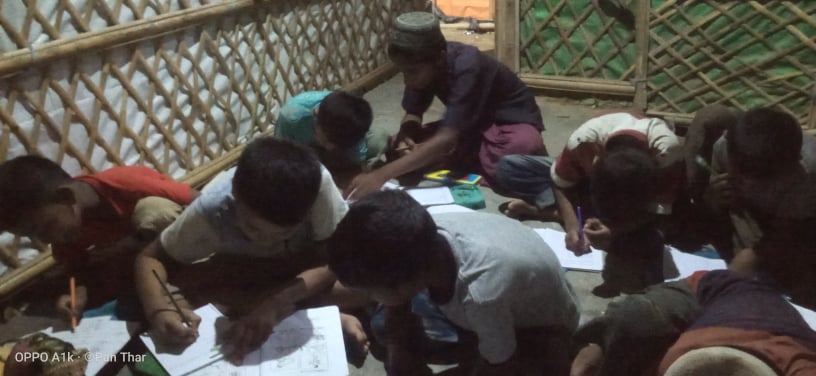 Rohingya Community (FSRC) by night. Both are my professions to help my community to improve and show their talents for the entire world. I choose this both work to help my people who didn’t get enough health care and proper education. When I work in the field to improve my community for their health care, I seek to change their negative mind for a better understanding what people must need to change and to improve the entire world day by day. When I’m in the class to teach our historical book, my younger generation don’t know how we need to note and we forget what we faced genocidal operation in our birthplace and for what but I teach them again and again to remember what we need to change our world.”
Rohingya Community (FSRC) by night. Both are my professions to help my community to improve and show their talents for the entire world. I choose this both work to help my people who didn’t get enough health care and proper education. When I work in the field to improve my community for their health care, I seek to change their negative mind for a better understanding what people must need to change and to improve the entire world day by day. When I’m in the class to teach our historical book, my younger generation don’t know how we need to note and we forget what we faced genocidal operation in our birthplace and for what but I teach them again and again to remember what we need to change our world.”
He goes on,
“The project of Joint Rohingya Respond Program (JRRP) was organized by Food for the Hungry and Medical Teams International (FH & MTI) to help the most vulnerable Rohingya people.
One my ambitions was to become a doctor to cure my people but [I am] unable because my brutal government don’t give us [the opportunity] to study. However, today, I can help other Rohingya through the organization for their health. In this pandemic situation, we want to add more information, there are still misconceptions and misunderstandings about mentally in our society.
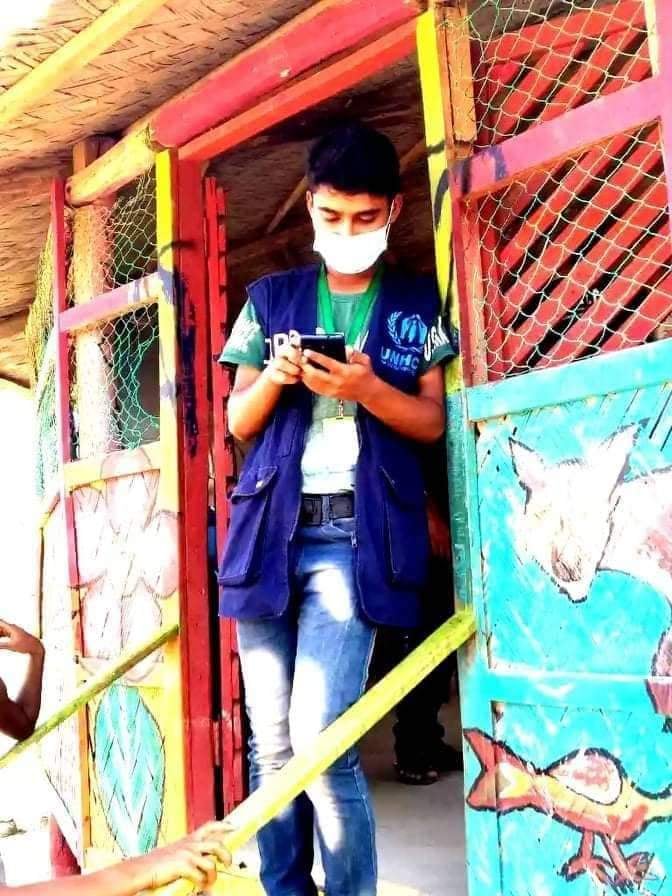 What are your thoughts about your repatriation? Can it happen?
What are your thoughts about your repatriation? Can it happen?
“We are so greatful to the Bangladesh government for saving hundreds of thousands of souls from the danger but we all want to go back home to our birthplace, Myanmar. But we must work to get our human rights. A Bangali poet says, ‘Born anywhere is a citizen of everywhere. This universe is ours.’ So, repatriation must be possible for me and my people who are inCox’s Bazar Refugee Camp if we get our all human rights. If not so, I’m far away from it.”
How close are you to the other poets in the camps? Do you work with them?
“I communicate and work with many Rohingya poets and poetesses who are writing poetry for different platforms. Our writing make us not only feel happy, but also to be proud of our activism for our community. Our pens are our guns. Our words are our bullets. Our inks are our activism.
How are you dealing with the corona virus? Are the big NGO organizations doing a good job?
“Here in the refugee camp, all the shelters are near to each other and it is crowded here. So, it is hard for us to maintain distance from each other but we are doing our best. And because of the lock down, it is also hard for us to go outside to buy things. All the NGOs are working their best to protect us from corona by providing masks and soaps, doing sessions on social distance and how to be safe. They also built isolation treatment center for the suspected corona virus patients.
What family do you have? How do they feel about your poetry activities?
“I was born to a poor family who was always eager to be educated. My beloved parents are Mr. Mohammed Younus (High School Teacher) and Mrs. Hafsa Bibi (Private Teacher) who are encouraging me to learn more and more about this darkness world. They always feel proud with me for being a poet and also are encouraging me to fight for our rights through poetry.”
Trading classroom visits
I read the Pan’s poem “I Am Rohingya” to my class on Thursday and then Friday morning (here in US) Pan invited me to meet his class via FaceTime. I joined his class briefly and said hello to his students. He and I talked about education and teaching. Pan and are are similar in that we are both teachers and learners, and I asked him if he had a message for my class. Here is what he wrote [edited per his request]:
“Dear Sir, Dr. Tom Arcaro, A hug thanks to you for keeping my writings to your mind and also sharing with your class. Today, I’m here to tell to the people of all over the world to focus to education. Being a minority people of Arakan, I was denied all my dignity and rights but I’m here to show what I have is in front of you as a little education. I strongly believe that if I have education, I can change the entire world. A popular saying that ‘Success isn’t depend how much money you have or how much qualified you are. It is all about believing on yourself’.
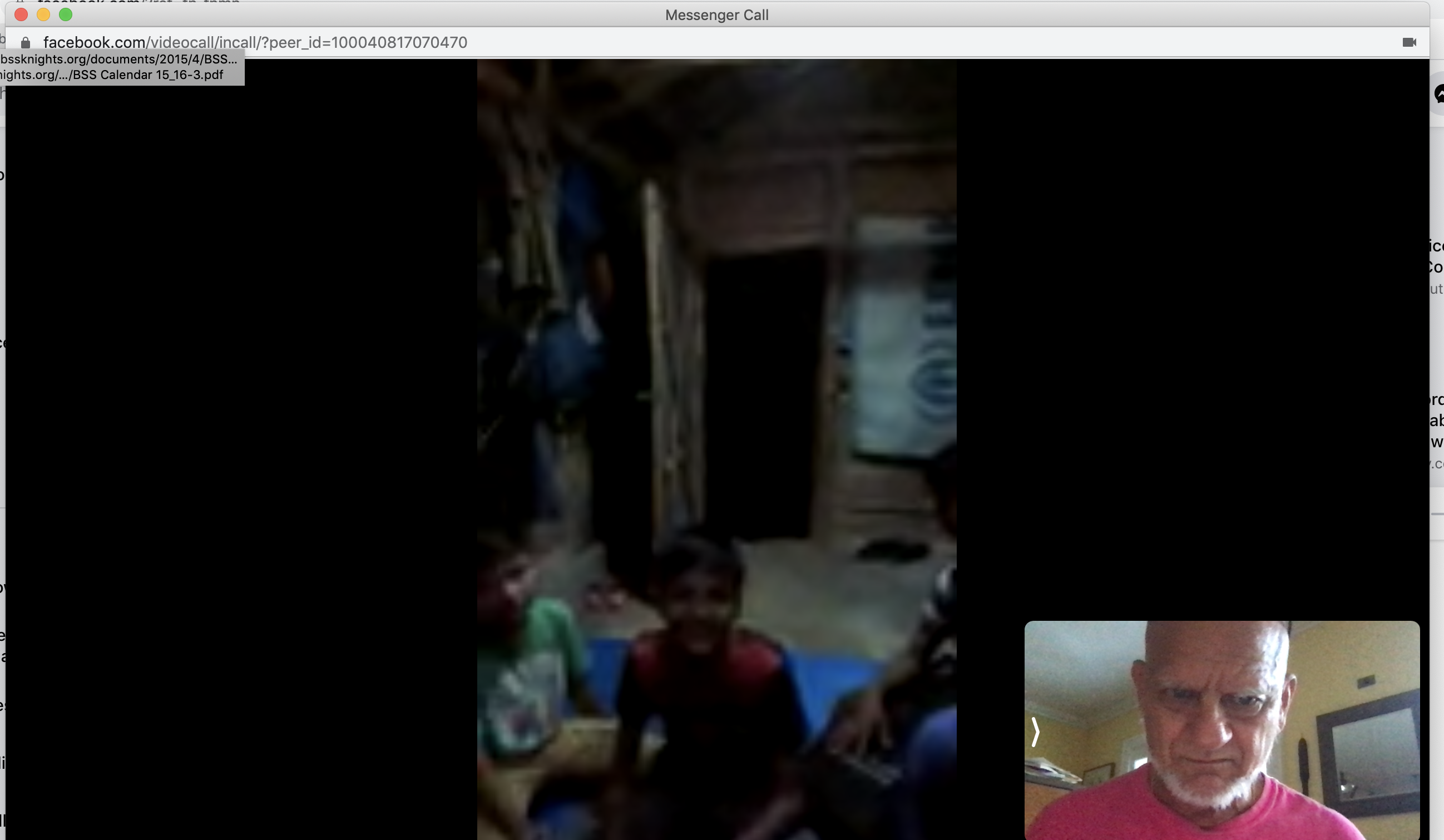
Education is the driver of your life. Be an educated people. I love to share my word to my people of all over the world ‘Life is never easy. So, never be over stressed. Just be strong and focus on what you have.’
Never stop learning. Education contributes to each child’s total growth and development. Be united for education to change our world. If we do hard work for a better plan, we will achieve our goal.
So, finally I would love to tell that I’m greatful to you for delivering my message to the global people and also the last message is “EDUCATION IS OUR SOLUTION”. So, Be an Educated people. Be an Educated People. Be an Educated People.
Yours Sincerely,
Pan Thar
Here is a view of the sprawling camp in Cox’s Bazar (linked with permission of owner).
A call to witness
I have been trusted by many Rohingya to hear and then sometimes share parts of their story. That said, I am a witness to an ongoing genocide. My incomplete and very humble response to what I witness is to constantly seek to learn more so that when I do have the opportunity to amplify voices I do so with fidelity to the truth and with all the grace I can muster.
I am reminded of the words of James Dawes. In That the World May Know he notes, “…giving voice can also be a matter of taking voice.” He goes on, “This contradiction between our impulse to heed trauma’s cry for representation and our instinct to protect it from representation –from invasive staring, simplification, dissection – is a split at the heart of human rights advocacy.” Indeed.
Please contact me here (arcaro@elon.edu) if you have questions, comments, or feedback.
Post Script
I learned this morning that Pan Thar co-authored a poem that was chosen by the Art Garden of the Rohingya as one of the top 5 poems in English they published in October. Congratulations to all!


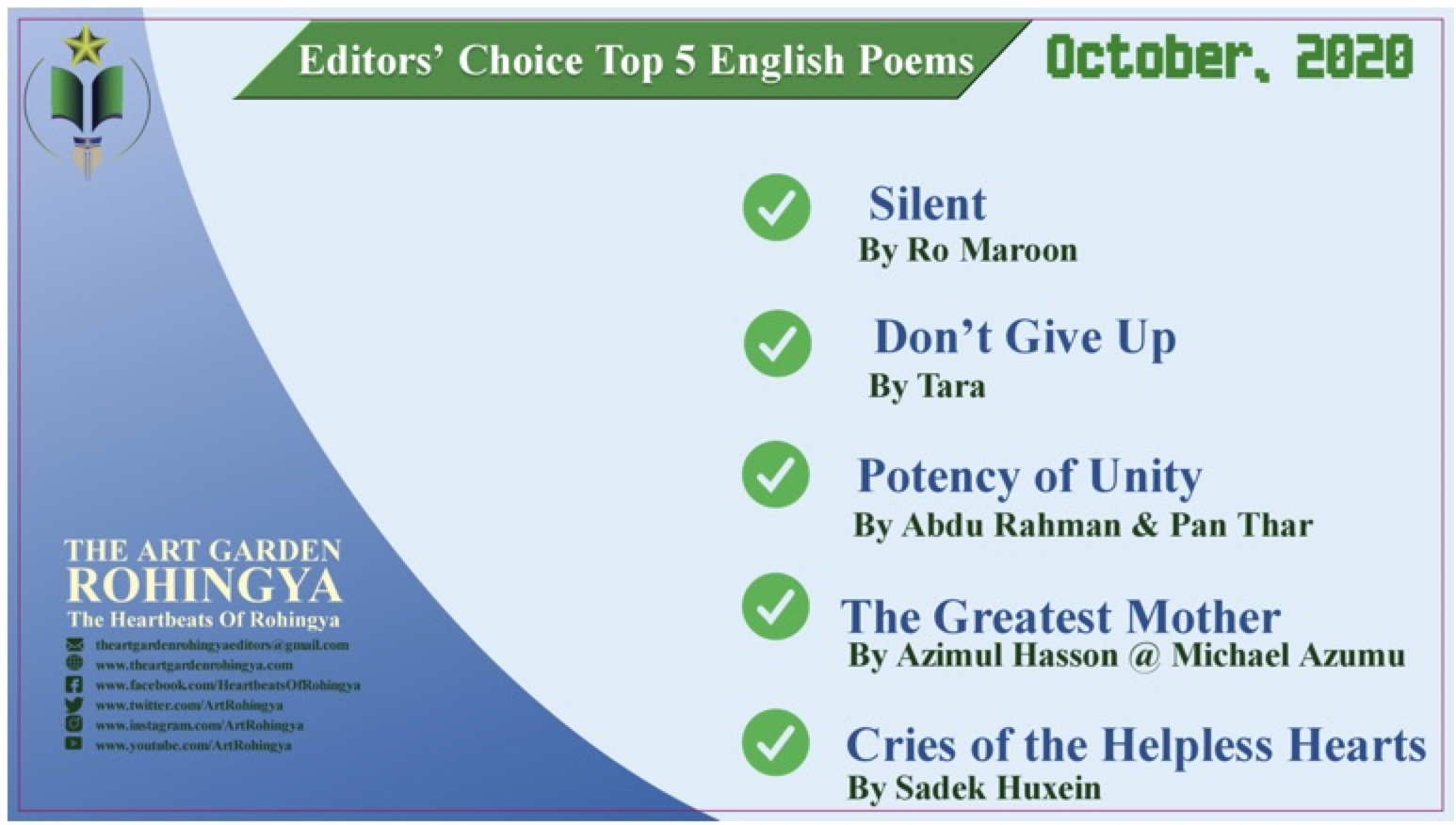
 Follow
Follow